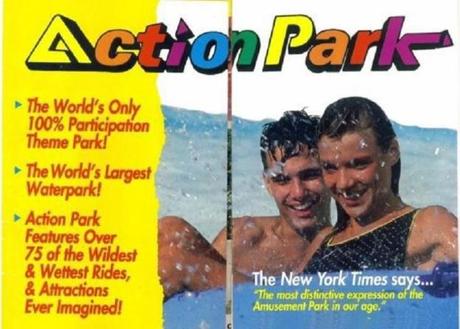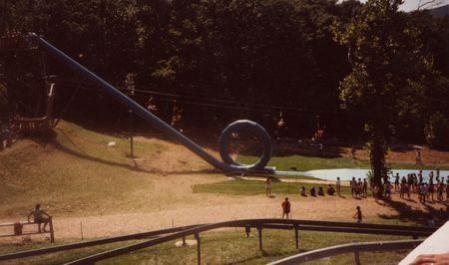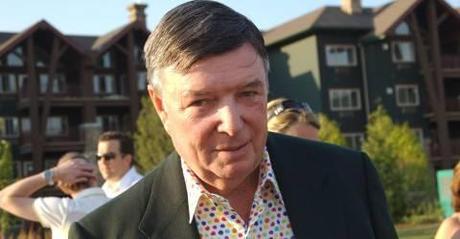
How bad did something in the 1980s have to be for even Donald Trump to walk away and say it was too risky?
That's one potential hook for Class Action Park, a new HBO Max documentary, but rather admirably it's not the actual hook directors Seth Porges and Chris Charles Scott chose to lead with. Trump's brief flirtation with maybe investing in the legendary New Jersey theme park known simply as Action Park isn't even mentioned until you're already two-thirds of the way in. By that point, you've already heard a thoroughly "it was the 80s" story of penny stock billionaires, trampled local laws, negligent parenting, potential money laundering, and insanely dangerous theme park rides, many of which literally began their lives as the napkin noodles of an arrogant, unchecked madman named Eugene Mulvihill. Trump's brief cameo is just a throw-in anecdote on top of a whole lot of crazy, most of its characterized by "only in Reagan's America" themes of corruption, individualism, and reckless naivete

Having grown up in the American Midwest in roughly the same era depicted in the documentary, I never attended Action Park but I relate to the various stories of endless summer days spent in wave pools, gocarts, and death-defying rides. (I even have my own story of almost drowning in an elbow-to-elbow wave pool.) Like seemingly everywhere else in the country, we had our own regional theme parks. One of them, Joyworld, even has its own documentary, Joyland: Reliving the Memories (2019), and having seen both I can say Class Action Park certainly has a similar shape to Joyland: the rise and fall of a very of-its-time attraction, as told by adults looking back on the good old days with a mixture of nostalgia and regret.
But Action Park was no mere "regional theme park." Attracting some 20,000 people a day from the tri-state area between 1976 and 1996, Action Park - the self-proclaimed "world's largest waterpark" - was like the wild, wild west of amusement parks. It was backed by a completely made-up insurance company, run largely by teenage employees who didn't know what the hell they were doing, and operated as if local safety laws were mere nuisances to be ignored.
As such, Action Park's tales of excess are so legendary it's already received an oral history Mental Floss article, a full-length book, and holds an eternal spot on any "most dangerous amusement parks of all time" list. So, why not add a documentary to the content pile?
Yet, the vexing part about Action Park is the way it waffles on whether a largely lawless theme park featuring rides no safety-minded engineer would have touched was a good thing or a bad thing. The conclusion is more like "it was a thing that happened, for better or worse." Not helping matters is the way the doc is completely front-loaded with archival footage and cartoon recreations of Action Park's impossible rides, including the legendary Cannonball Loop which had to be closed to remove all of the teeth the human test subjects left behind from the many, many, maaaannnny crashes.

It all has the feel of a glorified YouTube countdown of the 10 craziest rides ever, as told by the people - some of them now famous comedians like Chris Gethard, others just regular folk - who grew up in the New Jersey area and used to work and/or go to Action Park every summer. This is not without its own inherent entertainment value, but you can't help but wonder if that's all Class Action Park has to offer.
It's in the doc's second half that we reach the "and then everything changed" Behind the Music moment, which comes to us in the form of interviews with the mother and brother of a kid who died at Action Park. Their grief, decades removed, is still palpable, hardly lessened by the legal settlement they finally secured out of Mulvihill, despite him fighting - and bold-faced lying to them - every step of the way. We later learn about the various other kids who died at Action Park, but none of their families are interviewed. So, there is an odd imbalance between the various ex-Action Park employees who share loving memories of their exceedingly eccentric boss Eugene Mulvihill and the grieving survivors who literally toasted the man's death in 2012.
I wish the directors had included more interviews with family members and maybe dug a little deeper. For example, one of the ex-employees gleefully recounts how Mulvihill once praised him for knowing "where all the bodies are hidden," but immediately after saying so the employee gets tight-lipped and sternly refuses to divulge any of those secrets. Considering Mulvihill's financial backing from a later-convicted 80s Wall Street asshole and whispers of mob connections, there would seem to be some potential skeletons in that closet but they remain unexcavated by Class Action Park.

When you reach the end of the documentary and one of Mulvihill's most vocal critics abruptly mentions having grown very close to him in his final years and praises him as a man capable of surprising benevolence, the whiplash is jarring.
However, the approach of Class Action Park is likely best summed up by one of its talking heads, comedian Chris Gethard who grew up attending and fearing Action Park. The way he sees it, Action Park is one of those 80s things adults joke about with friends at a bar, "Can you believe how dangerous it was? We could have died!" Alone with their shrink, however, they'll mutter: "God, I can't believe how dangerous it was. We could have died." Sadly, some of them did.
But, it was the 80s, and a rich-off-Wall-Street maverick bought some New Jersey land, made up a fake insurance company, and opened the doors to a theme park that would probably now make for a great setting for a season of Stranger Things. Huh. Man, the 80s were weird.
Class Action Park is currently available to stream on HBO Max. Head here for more information on how to get HBO Max.
For the nostalgic among us, here's the infamous episode of MTV's Headbanger's Ball where host Riki Rachtman and the guys from Alice in Chains spent a day at Action Park.

